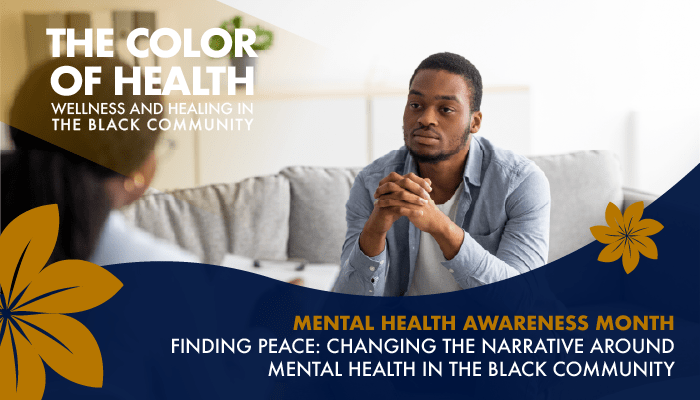The Color Of Health: Changing The Narrative Around Mental Health In The Black Community

For too long, mental health has been a taboo subject in the Black community, shrouded in silence, stigma, and misconceptions. But as we continue to break generational cycles and prioritize holistic wellness, it’s time to rewrite the narrative. Mental health matters, and acknowledging that truth is a powerful act of self-preservation, resistance, and growth in the Black community.
Why the silence?
Historically, the Black community has faced unique and ongoing challenges—systemic racism, economic disparities, intergenerational trauma, and cultural pressure to “stay strong.” All of these factors have compromised our mental health. As a result, many have been conditioned to suppress emotional pain and “push through,” often at the cost of their mental well-being, which has led to some stark and deeply concerning outcomes.
According to the 2021 National Survey on Drug Use and Health (NSDUH), while 21% of Black or African Americans experienced a mental health concern, only 39% received treatment—significantly lower than the 52% treatment rate among non-Hispanic whites. Suicide rates are especially alarming: between 2011 and 2021, suicide among Black Americans rose by 58%, becoming the third leading cause of death for those aged 15 to 24 in 2020—and again in 2022 for those ages 10 to 24, the Office of Minority Health noted. Alarmingly, the suicide rate for Black males was over four times higher than that of Black females in 2021, yet in a shift, Black female high school students were nearly twice as likely to attempt suicide as their male peers in 2023.
Black Americans are disproportionately affected by post-traumatic stress disorder (PTSD), with rates influenced by racism, intergenerational trauma, exposure to police brutality—especially through social media—and both verbal and physical attacks. A 2018 study found that many ethnic minority groups, including Black Americans, experience higher PTSD rates compared to their white counterparts.
Poverty compounds these issues further, as those living below the poverty line were found to be twice as likely to report serious psychological distress compared to those with higher incomes.
Mental health is not a weakness.

To shift the culture, we must first normalize the conversation around mental health. In the Black community, mental health is deeply drenched in stigma and often viewed as a weakness rather than a human emotion, Dr. Christine M. Crawford, MD, PFH, told McLean Hospital. The idea that therapy is only for the weak, or that praying away the pain is the only acceptable solution, has left many suffering in silence.
Dr. Crawford shared that many Black individuals often hesitate to express concerns about their mental health out of fear of being judged or mistreated, fears rooted in long-standing social stigma and systemic bias within the healthcare system. When Black Americans do seek help, they are disproportionately more likely to receive care through emergency departments rather than from mental health professionals who are equipped to provide personalized, ongoing support. To make matters even worse, a lack of affordable healthcare can make accessing the right mental health provider challenging.
“The lack of cultural sensitivity by health care professionals, African Americans feeling marginalized, and the reliance on family, community, and spiritual support instead of medical or psychiatric treatment, even when it is critically necessary,” are also contributing to this crisis, the health expert explained. To address this disparity, Dr. Crawford said it’s important to develop culturally competent care plans, ones that are mindful of lived experiences and, ideally, delivered by providers who share or understand their cultural background.
We must create a safe place for Black people to talk openly about mental health.
Creating safe, affirming spaces is a critical step toward building trust and improving mental health outcomes in the Black community. Talking openly about anxiety, depression, grief, and trauma within families, friend groups, and community spaces can help dismantle the stigma. Sharing personal experiences, checking in on one another, and creating safe environments for vulnerability are all powerful steps.
Another key part of the solution is increasing access to culturally competent care. Many Black individuals feel misunderstood or dismissed by mental health professionals who lack cultural awareness. Supporting and promoting Black therapists, counselors, and wellness practitioners can help bridge that trust gap. Platforms like Therapy for Black Girls, Black Men Heal, and the Boris L. Henson Foundation are making mental health support more accessible and relatable.
Healing is power.
Seeking help is not a betrayal of strength, it’s an act of courage. In a society that often devalues Black lives, prioritizing mental health is a radical and necessary form of self-care. Healing doesn’t happen in isolation. It happens when communities come together to break the silence, offer support, and reimagine wellness as a collective goal.
SEE ALSO:

